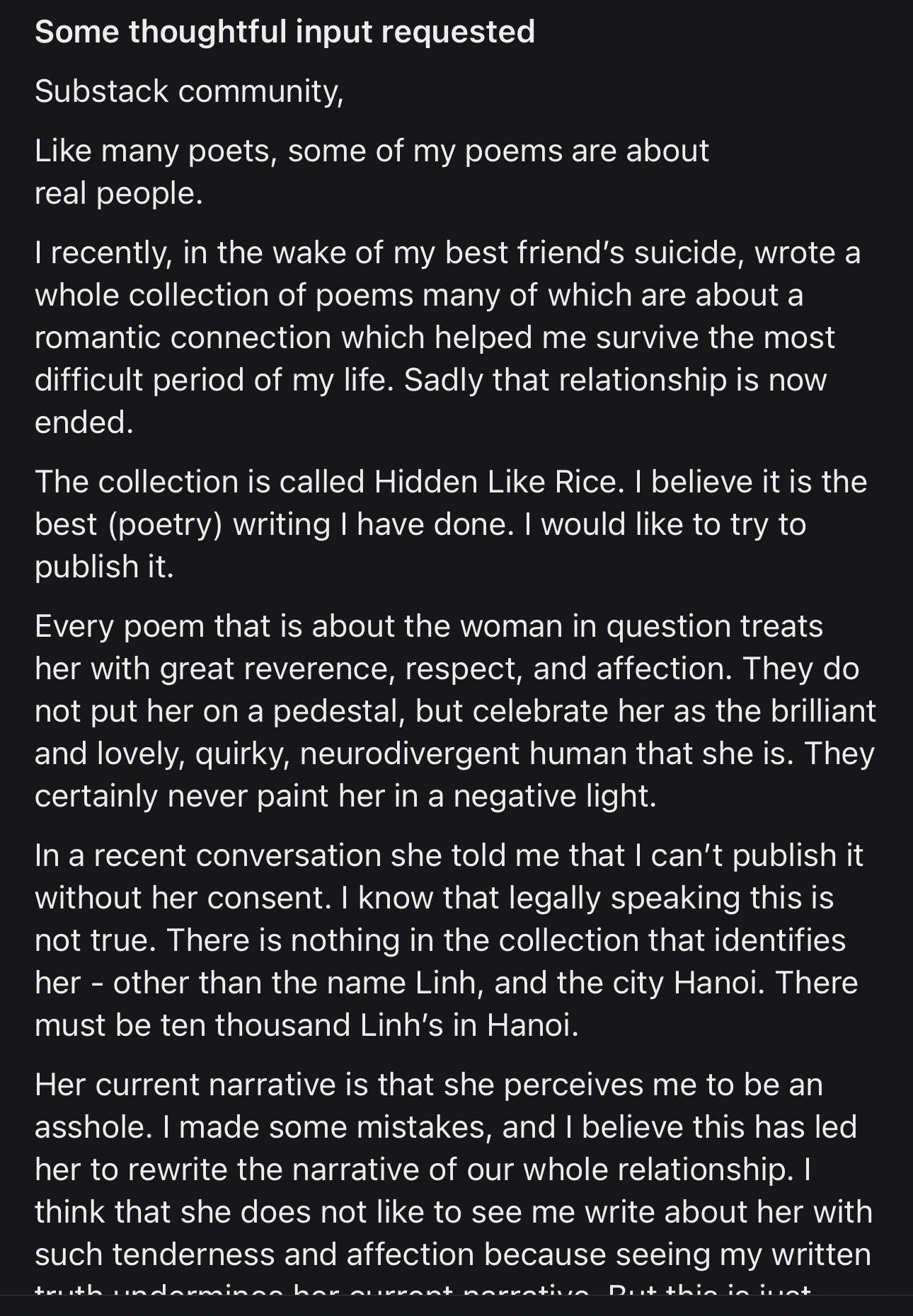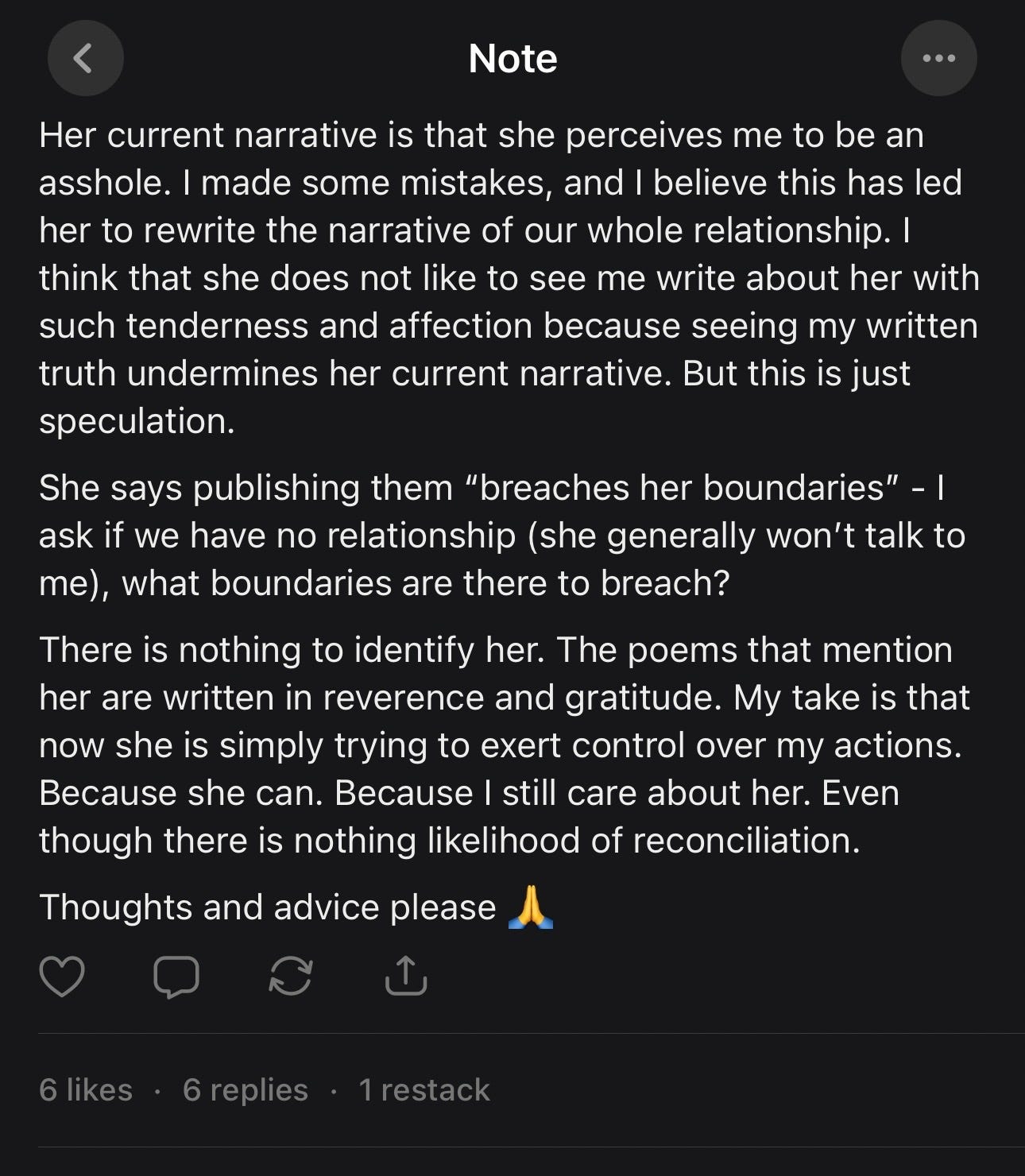At some point during the aftermath, I found myself looping “The Hanging Tree.”
Are you, are you
Coming to the tree?
Not the melody
Not nostalgia
But it captured what it feels like
when one’s dignity is symbolically hung —
and you’re left standing
at the very tree
where others stay silent.
That something strange did happen here,
and pretending otherwise
would be stranger still.
Et soudain j’ai pris peur quand je les entendais me dire
Non, mais qu’est-ce que tu t’embêtes ? Tu t’prends la tête ?
Ce gars-là n’est pas net — et il est fauché.
Je suis sûr qu’il ne reflète pas vraiment ce qu’il est.
⸻
Ainsi bas la vida.
Case Study Discussion
The following is an excerpt from a now-deleted public post. It is presented here with identifying elements blurred for the purpose of reflective discussion.
This text raises relevant questions in applied ethics:
Can expressions of affection override the absence of consent in storytelling?
Is anonymization sufficient when contextual clues remain traceable?
How do power, authorship, and narrative legitimacy operate in personal but public accounts?
Participants are invited to critically examine how moral intent, rhetorical tone, and implicit authority interact — especially when writing about others post-relationship, particularly in the absence of explicit consent.
The hellebore blooms before spring, elegant but uninvited — toxic at its core, yet often mistaken for grace.
Read the full series
- Entry 1: The Man Who Taught Me Ethics by Failing All of Them
- Entry 2: The Disappearance of the Public Poet
- Entry 3: The Hanging Tree Case Study (you are here)
- Entry 4: Hidden Like Accountability
- Entry 5: The Collapse of Assumptions
- Entry 6: The Ethics of a Tinder Bio
- Entry 7: How He Ate Told Me Everything
- Entry 8: What Makes a Scholar Dangerous
- Entry 9: Fragment of Life, Fragment of Accountability
- Entry 10: Anatomy of Disappointment
- Entry 11: Legal Defense Challenges: A Framing Statement
- Entry 12: Six Years After Ronell – What Academia Still Doesn’t Get
- Entry 13: QUT and The Man Who Raped Me
- Entry 14: Why Sarcasm Toward Institutions Can Backfire
- Entry 15: P*ssy or Toxic Masculinity?
- Entry 16: Who is Your Favorite Comedian?
- Entry 17: And What is Your Favorite Song?
- Entry 18: Grant Proposal — Narrative Ethics as Survivor-Led Forensics
- Entry 19: The Coward Behind the Clone
- Entry 20: [URGENT HIRE] CRISIS COMMUNICATIONS SPECIALIST
- Entry 21: [URGENT] Legal Counsel Needed for Complex Reputation Rehabilitation
- Entry 22: YOU’RE AN ABUSER. STOP CONTACTING ME
- Entry 23: Seeking Counsel for a Fallen Academic
- Entry 24: Internal Legal-PR Briefing
- Entry 25: For Journalists – Legal & Ethical Clearance Summary
- Entry 26: Symbolic Prostitution, Transactional Intimacy, or Just a “Loan”?
- Entry 28: Why He Simply Cannot Shut Up
- Entry 29: Forensic Commentary on “LARGE Language Muddle”
- Entry 30: Don’t Just Threaten My Future. Because I’m Going To Archive Your Present
- Entry 31: Open Letter to the Person Who Tried to Break Me with Defamation
- Entry 32: Defamation, Harassment, Doxxing Class 101
- Entry 33: Confidential Crisis Recovery Proposal
- Entry 34: Forensic Behavioral-Somatic Report
- Entry 35: Forensic Commentary on the Tattoos
- Entry 36: QUT and the Abuser They Once Had
- Entry 38: When Poetry Becomes Revenge Porn
- Entry 40: A Man Built for Applause, Not Accountability
- Entry 41: Neurobehavioral Addendum
- Entry 43: Why Does It Sound Like a War Metaphor?
- Entry 44: Forensic Commentary on Racialized and Fetishizing Language in “Hidden Like Rice”
- Entry 45: Public Misuse of Former Academic Affiliation
- Entry 46: The Two Things That Didn’t Leave a Bad Impression
- Entry 47: When Affection is Just an Alibi (A Bundy-Inspired Reflection)
- Entry 48: Humbert, Lolita, and the Fetish of Fragility
- Entry 49: The Fetish of Smallness as Symbolic Violence
- Entry 50: Motif Risk Analysis
- Entry 52: Can an Abuser Be a Good Father?
- Entry 53: Who Protects the Children?
- Entry 54: From Blackmail to Children
- Reflection: The Miscalculation
(More entries coming soon)
→ [Back to Start: Introducing Mr. J, a Former Professor Series]
Credits:
— The Hanging Tree, Suzanne Collins
— Ainsi Bas La Vida, Indila
— Image via Unsplash / Aditya Chinchure / Annie Spratt
© 2025 Linh Ng. All rights reserved.
This publication is intended for educational and reflective purposes only.
Sharing the original link is welcomed and encouraged.
Please do not reproduce, redistribute, or translate this content — in whole or in part — without written permission.
This piece reflects both lived experience and critical analysis. It is not meant to be detached from its author or reframed without context.
Misuse or decontextualization may lead to formal clarification or takedown requests.
This work has been reviewed and quietly followed by scholars, educators, and ethics professionals across multiple sectors.
If your institution is engaging in critical discourse around narrative justice, symbolic coercion, or representational ethics, feel free to connect via Substack DMs or formal channels.
A regulatory case regarding this matter has already been classified under a protected status within national education integrity systems.
Should any reputational countermeasures or distortions arise, I reserve the right to publish the documented timeline, behavioral patterns, and contextual metadata.
All relevant documentation has been submitted through formal legal and regulatory pathways.







